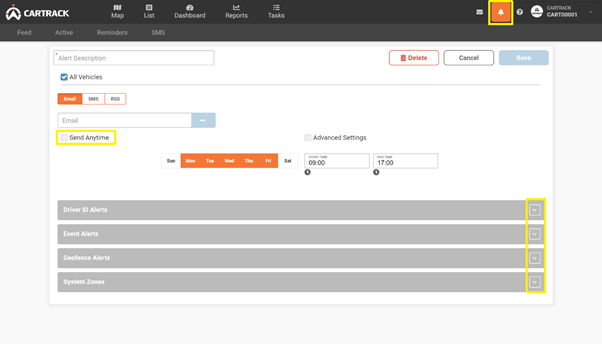Improved Driver Behaviour
Driver behaviour is a key part of operational and reputational management for any business.
It is particularly critical in fleet management, as implementing more efficient and accountable driving practices could not only increase the bottom line of companies, but inculcate far better safety for all concerned.
One of the most effective means to curb poor driver behaviour is intelligent telematics in fleet management. Fleet managers can extract data relating to both their drivers and their fleet of vehicles, and based on this data, take appropriate action.
This data can be collected in real-time, which means that there can be swift and timely remedies taken to curb costly driver behaviour.
Can GPS Tracking Help Drivers "Do The Right Thing"?
Good driver practices are important because:
- Poor driver behaviour is the main factor in road accidents
- Poor driver behaviour shortens the life of your vehicle
- Driver behaviour impacts fuel consumption
- Better driver behaviour will increase productivity and efficiency
Cartrack’s Fleet Management System allows you to view detailed statistics about driver behaviour through proprietary scorecards, live activity monitoring and comprehensive reports.
On the contrary, an event-based GPS tracker only gets activated and sends a signal when a significant event occurs.
Cartrack offers event-based tracking, which is configured to transmit location and telemetry input data at regular intervals (typically one-minute, two-minute or five-minute intervals while the ignition status is on), or when an event occurs (door open/close, auxiliary equipment on/off, geofence border cross). Each event triggers the unit to transmit data.
Cartrack platform integrates seamlessly with Google Maps, allowing a variety of views to best suit your needs.
If the vehicle is prevented from transmitting activity, 80
000 events are stored and transmitted when connectivity is restored.
With Cartrack event-based GPS tracking, you’ll be able to view a far more accurate representation of your vehicle’s activity on the map while also being able to access more detailed, meaningful information when creating reports and alerts.
Cartrack’s GPS event-based live tracking reports a vehicle’s position whenever it:
- Change’s ignition state
- Accelerates and Decelerates
- Deviates 5 degrees when turning
- Detects any cases of harsh turning, braking and acceleration
- Exceeds speed thresholds
- Detects vehicle idling
One of the most effective means to curb poor driver behaviour is intelligent telematics in fleet management. Fleet managers can extract data relating to both their drivers and their fleet of vehicles, and based on this data, take appropriate action. This data can often be collected in real-time, which means that there can be swift and timely remedies taken to curb costly driver behaviour.
There are 6-7 driver behaviour reports, video of one of these being generated
We have two ways of managing speed, per vehicle we set a unique set speed i.e., truck 90km. every time you over speed it alerts and reports on it. Every event gets compared to the road speed and its highlighted when it’s over the road speed.

Are you Aware of your Driver Behaviour?
If you’re not using Alerts stop what you’re doing, grab a fresh cuppa and let me tell you about how Automated Alerts can improve your fleet management.
With Cartrack’s real-time, event-based tracking, you can set up location, geofence, speeding and driving behaviour notifications to be sent straight to your mobile phone.
- Speeding Notifications: A vehicle travelling at 107kms per hour uses 20-25% more fuel than a vehicle travelling at 100kms per hours.
- Use Alerts to highlight any event where a vehicle travels over the road speed limit. Customise it further to specify speeding events over a certain kms per hour, to target the occurrences in which you are notified about.
- Harsh Driving Notifications: A vehicle which is subjected to harsh breaking, acceleration or cornering can require more frequent servicing and maintenance, costing the company more per vehicle in the long run.
- Unscheduled Usage Alerts: Maintain worksite safety and ensure heavy machinery isn’t used out of hours.
- Failure to Arrive on Time Alerts: Keep your customers and clients happy by immediately alerting them to any delays in service.
- Worktime: particularly useful for Drivers on the road for long periods of time. Set an Alert after a certain number of hours for the Driver to stop and take a break.
With over 20 different Event Alerts the applications are endless

- Add Alerts by clicking the blue button found on the Alerts Feed Dashboard
- Un-tick ‘Send Anytime’ to customise when Alerts are received
- Select Alerts from the expandable menus under each section

“We know where our guys are going.”
While you may know which job sites your drivers are headed to, this is not the reason why you should track company vehicles. If you’re in the service industry, it’s about improving ETAs for your customers and getting the drivers to job sites faster. If you don’t know what’s causing your high fuel costs, tracking your company vehicles will reveal the answer to you whether it’s because of unnecessary miles driven, wasted trips, long idle times, etc. The best way to see this is by piloting a solution to receive benchmarks of how your fleet is performing.
“I don’t want to upset the drivers overlooking every move
The most common objection we hear about tracking company vehicles is the “Big Brother” theory, or that it’s an invasion of privacy. While not upsetting your drivers is a valid concern, think about it this way – every other business has metrics for their employees to hit, so why should a mobile workforce be any different? Tracking company vehicles is not about distrusting your drivers; it’s a means of controlling costs, improving efficiencies, and driving revenue for the company. In our experience, if drivers are still pushing back after it’s presented like this, there’s a reason.
Don’t be afraid to improve and grow your business by tracking company vehicles because of any of these objections.

Here are some facts as to why good driver behaviour is so important:
- Poor driver behaviour is the main factor in road accidents
Most accidents can be attributed to human error. Adverse driver behaviour is the leading cause of these errors; in fact, over 90% of road crashes are caused by undesirable driver behaviour. Typical elements of driver behaviour that could lead to accidents include speeding, harsh turning, harsh braking and alcohol consumption.
- Poor driver behaviour shortens the life of your vehicles
Poor driving habits don’t only result in accidents; they also considerably reduce the lifespan of your vehicles. Driver behaviour such as idling, harsh turning, harsh braking and illegal actions that drivers take on the road are likely to compromise the quality and longevity of vehicles. Conversely, drivers who adopt good driving practices on the road are less likely to wear vehicles out.
- Driver behaviour impacts fuel consumption
Many of the bad driving behaviours described above will also result in unnecessary fuel wastage. To maximise the use of fuel, it is essential that drivers maintain a reasonable and law-abiding speed, don’t rush towards red traffic lights, don’t idle and don’t brake or turn harshly. Correcting driver behaviour can prove to be critical in conserving fuel use.
- Better driver behaviour will increase productivity and efficiency
Driver behaviour is also a vital factor in determining the profitability of many companies, especially those that employ a fleet of vehicles. Correct driver behaviour will lead to fewer accidents, less breakdowns and will ultimately result in company vehicles reaching their intended destination in a more prompt and efficient manner.
One of the most effective means to curb poor driver behaviour is intelligent telematics in fleet management. Fleet managers can extract data relating to both their drivers and their fleet of vehicles, and based on this data, take appropriate action. This data can often be collected in real-time, which means that there can be swift and timely remedies taken to curb costly driver behaviour.
